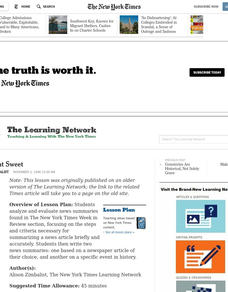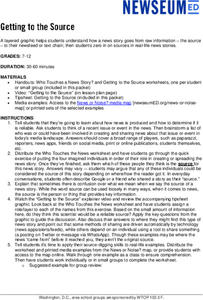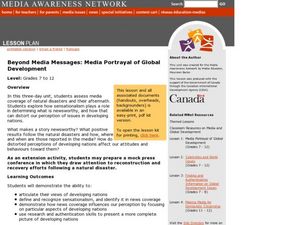Curated OER
BBC News School Report: Write As You Speak
Middle schoolers complete this journalism/language arts worksheet to improve their writing. They work in partners interviewing each other, then write key facts in a table, summarizing what, who, where, when, why. They make their...
Curated OER
Staying Informed
Students identify the various ways the American public can stay informed on the news. In groups, they brainstorm reasons why the public should not stick to one source for their news. They use this information to examine their own current...
Curated OER
The Furry News: How to Make a Newspaper
Students investigate the process of making a newspaper using children's literature to create context for the lesson. The readers are asked to predict the events of the story as it is read to them. Then the teacher uses guided questions...
Curated OER
Breaking News: Syria Protests Getting Bigger (April 16th, 2011)
Students explore current events by participating in several worksheet style activities. In this Syrian protest lesson, students read a news article discussing the Syrian uprising that took place in April of 2011. Students complete...
Curated OER
Short But Sweet
After analyzing and evaluating news summaries found in the New York Times "Week in Review" section, middle schoolers study the steps for summarizing a news article briefly and accurately. They write two news summaries: one on a newspaper...
Newseum
Getting to the Source
Reliable news stories are based on facts from reliable sources. Young journalists learn how to evaluate the reliability of news sources by watching a short explainer video. Teams apply their new source-digging skills to a current news...
Curated OER
Cartoons for the Classroom: What's Replacing Our Newspapers?
What is happening to print media? Use this political cartoon analysis handout to facilitate pupil exploration of the online-media takeover and the decline of newspapers. Background information gives them context, and 3 talking points...
Curated OER
Current Event Project
One of the best ways to make history relevant and engaging is to analyze current events before they become history! Check out these project guidelines for a current event research paper, outlining the major required sections of the...
iCivics
Lesson 3: Bias
How do journalists balance bias and ethical reporting? The final lesson in a series of five from iCivics examines the different types of bias and how they affect the news we read. Young reporters take to the Internet to find examples of...
iCivics
Lesson 1: Journalism
Extra! Extra! Do your pupils know what it takes to be a good journalist? Young news hounds explore the world of journalism through a series of activities that focus on ethical reporting. Learners read, evaluate, and investigate popular...
Newseum
Journalists Code of Ethics
Journalists are supposed to adhere to a Code of Ethics. To determine the degree to which reporters follow this code, individuals select three recent stories with photographs from newspapers, magazines, online news sites, or television...
Newseum
Is This Story Share-Worthy?
Young journalists use a "Is This Story Share-Worthy?" flowchart graphic to decide whether a story is worth sharing online. Instructors provide groups with fake news, poor quality stories, opinion pieces, biased news, and high-quality...
Class Antics
Leap Year: Write a Newspaper Article
Extra! Extra! Read all about leap year! Here, scholars write a newspaper article all about leap year/leap day from given facts including who, what, where, when, and why.
Discovery Education
Election in the News
Young people are the future voices of the country. In order to be knowledgeable about local and federal elections, future voters must first become aware. Bring an informative lesson plan to your social studies class, in which middle and...
Newspaper Association of America
Using the Newspaper to Teach the Five Freedoms of the First Amendment
Of all the amendments found in The Bill of Rights, the First Amendment contains some of the most important freedoms for American citizens. A unit plan on the First Amendment features interactive lesson plans designed to teach about those...
NASA
The Big Climate Change Experiment Lesson 5: Climate Change Narratives
And now moving on to the next story. The last of five lessons in Unit 1: The Big Climate Change Experiment requires groups to create a script for a news segment on climate change. They either make a video of their story or conduct a live...
Media Smarts
Media Awareness Network: Hate or Debate?
Discuss the difference between legitimate debate on a political issue and arguments that are based on hate through a science-fiction scenario that shows how a controversial issue can be discussed in both ways. Then learn how purveyors of...
Judicial Branch of California
The Power of the Press: The First Amendment
Was what happened in 1886 at the Haymarket riot a crime or a case of xenophobia? Using political cartoons from the time, young historians consider the role the media played in anti-labor sentiment during the time and how that influenced...
Curated OER
Beyond Media Messages: Media Portrayal of Global Development
Students discuss global development and create a graphic representation of the discussion. In this media analysis lesson, students deconstruct disaster coverage by reading articles and identifying missing information. Students research...
Curated OER
News Quiz | Jan. 17, 2012
Read to get informed! Kids scan a copy of the New York Times from January 17, 2012 to answer five multiple choice questions.
Curated OER
News Quiz | Dec, 6, 2011
Peruse the paper to answer five multiple choice questions. This quiz offers a link to the New York Times paper published on December 6, 2011. Learners scan the articles, then answer each of the related questions.
Curated OER
News Quiz; Dec. 1, 2011
Build a classroom of informed citizens. Pupils read or scan several articles from the December 1, 2011 New York Times, then answer five related multiple choice questions. Great for primary source analysis.
Curated OER
News Quiz: November 21, 2011
Kids can scan New York Times articles published on November 21, 2011 to answer five multiple choice questions. They'll click on the link to "today's paper" to access the articles and then toggle through each of the five related questions.
Curated OER
News Quiz: April 18, 2012
After reading several New York Times articles posted on April 18, 2012, kids take a quiz. They read the articles found in that paper, then take a six-question multiple choice quiz. A great way to teach kids how to become informed citizens.
Other popular searches
- Newspapers
- Usa and World News
- Education News
- Printing Press
- Agriculture News
- News Magazines
- Newspaper Activities
- Current Events Newspaper
- Newsletter
- Newspaper Articles
- News Broadcast
- News Article

























